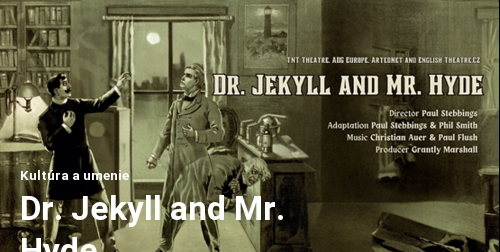Dr. Jekyll and Mr. Hyde
01.04.2025 19:59
Kultúra a umenie
Autor : Timea Balážiková, Gymnázium Ivana Kupca, Hlohovec
Shadows of the Mind
I recently attended a performance of Dr. Jekyll and Mr. Hyde, and it was a truly thought-provoking experience. Based on the famous novel by Robert Louis Stevenson, the play left me with a lot to think about, long after the curtain fell. That is why I named this article Shadows of the Mind, While it’s a story about a man who battles between his good and evil sides, it also touches on themes of the complexities of human nature.
The plot revolves around Dr. Jekyll, a respected and kind-hearted doctor, who becomes obsessed with separating the two sides of his personality. He creates a potion that transforms him into the dangerous and violent Mr. Hyde. As the play unfolds, it explores the dark, hidden sides of Jekyll’s character, which leads to tragic consequences. But beyond the surface, I couldn’t help but see deeper meanings in the story.
The play took place in the Victorian period, period famous for its strict social expectations, especially regarding morality and behavior. Dr. Jekyll is a product of this society, someone who is expected to maintain a perfect, controlled public image. But his inner desires, which go against the moral code of his time, drive him to experiment with the dangerous potion. I saw this as a metaphor for the way society forces people to hide their true selves, creating internal conflict. Jekyll’s transformation into Hyde can be seen as a response to the overwhelming pressures of maintaining a “good” image, much like how people today might decide to distance their true selves in order to be liked.
The play can also be interpreted as a reflection on addiction. Jekyll’s repeated use of the potion, even when he knows it’s destroying him, reminded me of the cycle of addiction. The potion itself could symbolize the temporary escape that substances offer—at first, it provides freedom, but ultimately it leads to destruction. Jekyll’s inability to control when he turns into Hyde mirrors the uncontrollable nature of addiction, where a person thinks they are under control, realizing how wrong they are once it is too late.
One of the scariest aspects of the novel is how Jekyll loses himself completely. He initially views Hyde as a separate entity, a different person who exists outside of himself. But as Hyde grows stronger, Jekyll realizes that Hyde is him-his true self, stripped of morality and conscience.
I feel like this can reflect the psychological concept of dissociation, where a person may feel disconnected from parts of their personality or actions. Jekyll believes he can separate his good and evil sides, but instead, he ends up proving they are inseparable. In the end Dr. Jekyll kills himself before Mr. Hyde takes over him completely, symbolizing how dangerous it is to deny or try to destroy parts of oneself instead of trying to learn to acknowledge and manage them.
In Dr. Jekyll and Mr. Hyde, the female character plays a pivotal role as an intelligent and complex figure. Once deeply in love with Dr. Jekyll, she is not only a love interest but also the one who guides the audience through the story. Her sharp mind allows her to uncover the truth about Mr. Hyde's true identity, showing a strength of character that contrasts sharply with the dark forces surrounding Jekyll. As she navigates her inner conflict—balancing love, suspicion, and fear—she represents the "regular person," caught between the idealized expectations of Victorian society and the shocking truths she uncovers.
The performances were outstanding, They captured the characters inner struggles, vividly portraying them to audience. What stood out was the female character’s quiet strength, adding depth to the story and highlighting the complex relationships between men and women in society.
The lighting was also impressive, enhancing the atmosphere without relying on special effects. The changing lights, especially during Jekyll’s darker moments, emphasized the themes of duality and the unknown. The shadows created a sense of danger, heightening the tension whenever Hyde made his appearance on stage.
The music, too, was a highlight. The singing added depth to the emotions, especially in moments of inner conflict. It was a powerful way to communicate what words alone couldn’t express, and it helped to bring the audience closer to the characters’ struggles. The music felt like an emotional release, echoing the tension of the story.
Overall, Dr. Jekyll and Mr. Hyde was a captivating and unsettling play. It made me think about the way society influences our behavior and how, like Jekyll, we can become trapped by our own desires and the masks we wear. The hidden meanings, gave the play a timeless relevance. It’s a story that challenges us to think about the darkness that lies within all of us and the consequences of trying to separate or deny parts of ourselves.
I highly recommend this play to anyone who enjoys exploring the complexity of human nature and the deeper meanings behind classic stories.
